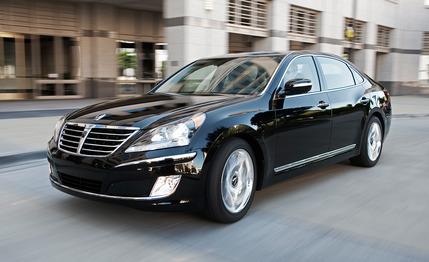
 First Drive Review
First Drive Review
When Hyundai announced the Genesis luxury sedan in 2008, some were skeptical. A $40,000 Hyundai? But the Genesis has been a hit with buyers, outselling the Audi A6 and Lexus GS combined. After two years on the market, sales of the Genesis are still increasing. Hyundai says this is a sign that American consumers are seeing the brand differently and are ready for Hyundai to head even farther upmarket. And so, with the 2011 Equus, the company has its sights set on the top of the luxury heap: cars like the Lexus LS and Mercedes-Benz S-class.
That bold goal comes with a proviso, however. The Equus was designed primarily with its home South Korean market in mind. Shoppers there are fervently loyal to domestic manufacturers—with Hyundai being the largest—and since this Equus went on sale there over a year ago, it has been successful at luring government officials and hot-shot businessmen out of the black Mercedes S-classes that are de rigueur for elites worldwide. So although it would be unfair to call the U.S. an afterthought, Hyundai knows the Equus doesn’t have wide-reaching American appeal, and it has set the sales targets at a realistically modest 2000 to 3000 cars per year.
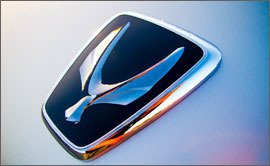

“A Classic Halo-Car Strategy,” According to Hyundai
The president and CEO of Hyundai’s U.S. operations, John Krafcik, hopes the Equus will cast a positive glow on the rest of the cars in the company’s lineup. It’s too hard to predict yet whether buyers will take notice of the Equus and think better of the Accent as a result, but one thing is for sure: It would be hard not to notice the Equus—especially in a Hyundai showroom. At 203.1 inches long, it is 7.2 inches longer than the already big Genesis sedan and less than an inch shy of the long-wheelbase LS. It’s within an inch in width of the Lexus, as well as of the BMW 7-series.
To power this behemoth, Hyundai turned to its fine 4.6-liter Tau V-8. Just as it does in the Genesis sedan, this smooth powerplant delivers 385 hp at 6500 rpm and 333 lb-ft of torque at 3500 (or 378 and 324, respectively, if running on regular gas instead of the recommended premium). Power is routed through the same six-speed ZF automatic transmission found in the Genesis 4.6, and Hyundai estimates EPA fuel-economy ratings of 16 mpg in the city and 24 mpg on the highway.
The power numbers are certainly nothing to be ashamed of, but they do fall midpack among the car’s intended benchmarks. The Equus betters the V-8–powered Audi A8’s 372 hp, but the Mercedes S550 will soon pack 429 hp. To stay competitive, the Equus will receive a new drivetrain in mid-2011 that combines a Hyundai-designed eight-speed automatic with a 5.0-liter version of the same Tau engine making as much as a Benz-matching 429 hp. Hyundai also will soon offer the Equus (as well as the Genesis sedan and coupe) with all-wheel drive to up appeal in colder climates.
Ride in Business Class
The Equus’s Korean target buyers are looking at this car not as one to drive but largely as one in which to be driven, and this has had a major impact on the car’s planning. The interior is cavernous. Passenger space rivals that of the Mercedes S-class and long-wheelbase Audi A8 and surpasses that of the stretched Lexus LS (and we won’t even get the extended-wheelbase version of the Equus offered in South Korea).
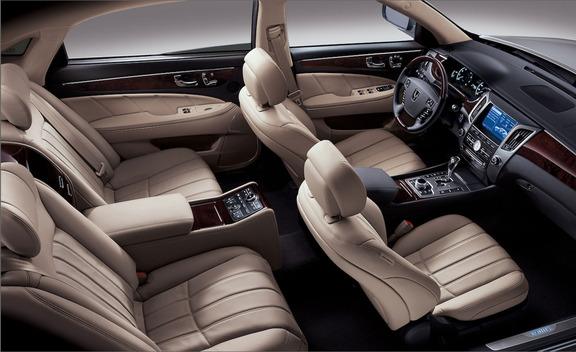

There are no options, so choosing between the two trim levels—Signature and Ultimate—is the only decision buyers have to make. Regardless of which version they choose, Equus-ites will be treated to unremarkable birch or walnut wood trim and a liberal application of leather around the cabin. None of it feels especially opulent—a disappointment in a car hyped as an S-class alternative—save the Alcantara headliner. Front-seat occupants have all the usual accouterments, including heated and cooled seats, a heated steering wheel, an easy-to-use infotainment and navigation system with an eight-inch screen, and a high-end Lexicon stereo. The driver’s seat in every Equus has a massage function, although it feels more as if it came from a shopping-mall gadget store than a spa.
Ponying up for the Ultimate replaces the rear bench seat with two individual thrones—one of which has a retractable footrest and a massage function. The Ultimate includes power headrests for both seats, a refrigerator in the center console, and an eight-inch monitor. Your driver will appreciate the forward-view cornering camera, and bellmen the power trunklid.
Dimensions of a Boat, Drives Like a Car
There’s no nice way to say it: The Equus packs the pounds onto the Genesis platform. Going by Hyundai’s estimates, the Equus is about 500 pounds beefier than a Genesis V-8. Surprisingly, the rear-wheel-drive Equus drives better than this weight—and its intended use as a limo—would suggest. All that beef and the long wheelbase make handling predictable. Oversteer isn’t much of a concern; it takes a deliberate hand to get the car to step out, and then only barely. The electronic stability control does an excellent job of maintaining the intended path, allowing the Equus to hustle through tight bends more gracefully than you would expect.
The air suspension, with its selectable ride height, makes for a comfortable ride, although pressing the sport button on the console—which is said to sharpen the suspension, steering, and transmission—has a negligible effect. That aside, Hyundai has accomplished one of its goals, demonstrating that it can build a big car that’s at least somewhat capable. The 385-hp V-8 is certainly adequate, and with it the Equus should be about a half-second behind the Genesis in the 0-to-60 run; figure on a number in the high-five-second range. That will improve, of course, when the new engine arrives next year. Wind and road noise are more noticeable than in the cars the Equus is meant to mimic.
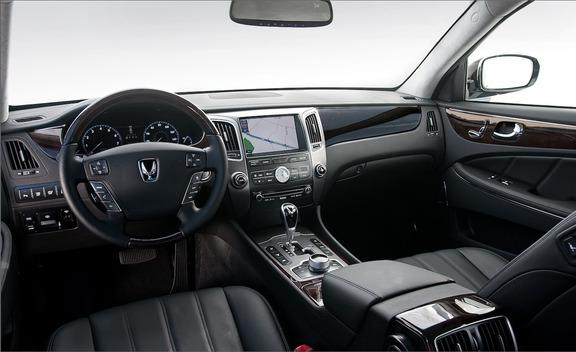

First-Class Service
The most significant Equus feature, though, is perhaps its “Your Time, Your Place” buying program. The goal is to alleviate the typical headaches of buying and servicing a car at a dealership (and maybe to save Equus shoppers the indignity of mixing with commoners looking for Elantras and Tucsons). Interested Equus customers only have to call their local Hyundai dealership and a designated Equus sales maven will bring the car to their home or office for a demonstration and test drive. Depending on where they are (consumer-protection laws vary from state to state), some customers will be able to purchase an Equus without setting foot in the dealership.
However a buyer takes possession of the car, servicing is all done without venturing to the dealership. An Apple iPad comes with every car and stores the owner’s manual, and owners schedule services such as oil changes or repairs through the iPad. Once a service is arranged, a technician will pick the car up from the owner’s home, office, or designated airport parking lot, leaving a loaner Equus or Genesis in its place. Since the Equus is available in only four colors (two of which are silver), there’s a 25-percent chance that an Equus loaner will look the same as your personal car and none of your friends will be the wiser. When the servicing is done, they’ll swap the loaner back for your car. If “Your Time, Your Place” is successful, Hyundai is looking to extend it to the Genesis sedan and any future premium vehicles as well.
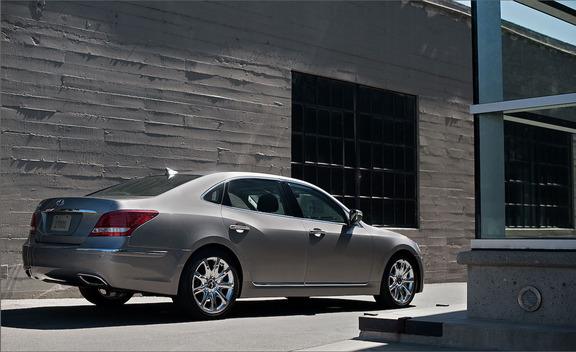

Imminent Arrival
The Equus is due in dealerships this fall, but Hyundai hasn’t set firm pricing. The company has indicated that the car will start in the mid-$50,000s, with the Ultimate trim demanding a few grand more. It may be a bargain compared with an S-class, but it doesn’t hold a candle to the big Benz—or any other premium flagship—in cachet, sumptuousness, or dynamics. The Equus will have to overcome some serious obstacles and the image of its own brand to make headway with its intended audience. Still, with the high-tech sales and service, massive list of gadgets, and business-class back seat, Hyundai shouldn’t have any problem finding a couple thousand thrifty-minded (but not poor) buyers each year. If not, we hear that New York City’s limo companies are champing at the bit (horse joke!) to add the Equus to their airport fleets.